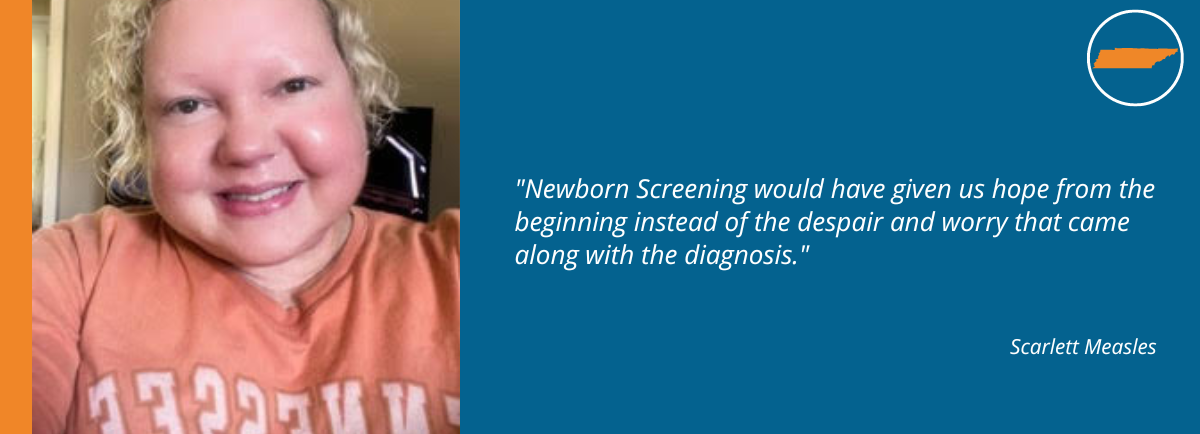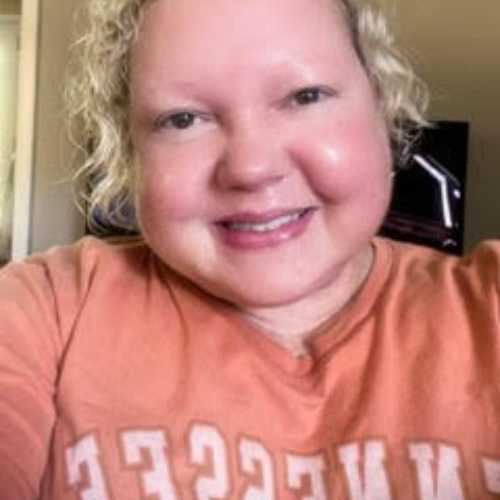DOWNLOAD STATE FACT SHEET AS PDF

In 2020, there were 78,689 live births in Tennessee2 There are 71 conditions on the Tennessee Newborn Screening Panel3
All babies in the United States are screened for several conditions shortly after birth. Approximately 24-48 hours after a baby is born in the United States, the heel is pricked by a nurse to collect a small blood sample. Afterward, the nurse puts a series of blood drops onto a filter paper to create several “dried blood spots.” Next, the newborn screening card is sent to the state laboratory for analysis. Tennessee has been screening for Krabbe Disease since 2017.
What is Krabbe Disease?
Krabbe disease (pronounced krab A), is a rare genetic disorder, also known as globoid cell leukodystrophy. In the United States, Krabbe disease has been reported to affect approximately 1 in 100,000 individuals. Infantile Krabbe disease is the most common and severe form causing infants to lose the ability to eat, extreme irritability, inability to sit up, grasp objects, blindness, and seizures. Sadly, infants die within the first 2-3 years of life in states that do not test for Krabbe disease. We invite you to learn more about Understanding Krabbe Disease.
Why Screen for Krabbe Disease?
Krabbe disease is a severe neurodegenerative and rapidly progressing condition requiring immediate treatment for the most severe forms. The medical issues and symptoms of Krabbe disease are very significant and life-impacting. A delayed diagnosis, especially in the most severe forms, equates to palliative and supportive care as the only means of treatment until premature death.
Krabbe Disease Hero: Scarlett Measles

See all our Krabbe Disease Heroes.
Scarlett Measles had a typical childhood and never expected to begin experiencing troubling symptoms at the age of sixteen. After months of seeing different doctors and undergoing numerous tests, Scarlett was diagnosed with Krabbe Disease in June 1996 at the age of seventeen.
Her neurologist informed her that she had a very rare disorder and provided Scarlett and her parents with information about the disease; he also mentioned that it was fatal. She soon found a specialist who told her parents to prepare to keep her comfortable because her body was going to deteriorate into a vegetative state and she would pass away. Scarlett continued to be told this for over a year and a half, leaving her devastated, scared, and angry.
Thankfully, Scarlett finally found someone with more knowledge of the disease and she discovered that she was eligible for treatment. She underwent a bone marrow transplant in February 1998 that successfully stopped the progression of the disease and she celebrated her 43rd birthday in 2022. Scarlett loves spending time with her family and friends, volunteering, and advocating, and has been working at physical therapy to learn to walk again.
Scarlett advocates for Newborn Screening for Krabbe Disease because it could have given her answers sooner and may have prevented her from needing to use a wheelchair. It would have given them hope from the beginning instead of the despair and worry that came along with the diagnosis.
Resources
- The Leukodystrophy Newborn Screening Action Network is dedicated to advancing newborn screening for leukodystrophies and lysosomal storage disorders, supporting newly-diagnosed families, and ensuring collaboration between all stakeholders. Learn more at https://ldnbs.org/.
- CDC offers funding and assistance through the Newborn Screening Quality Assurance Program (NSQAP). More information can be found at https://www.cdc.gov/labstandards/nsqap.html.
- Baby’s First Test provides funding opportunities through grants. Learn more at https://www.babysfirsttest.org/newborn-screening/funding-opportunities.
- American Public Health Laboratories NewSTEPS program provides data, technical assistance, and training. Details at https://www.newsteps.org/.
- KrabbeConnect offers patient support services to help families navigate the burden of Krabbe disease. Learn more at https://krabbeconnect.org/.
- Hunter’s Hope Foundation is a non-profit organization committed to giving hope through education, awareness, research, and family care for all leukodystrophies. Learn more at https://www.huntershope.org/.
Citations
- Wenger DA. Krabbe Disease. 2000 Jun 19 [Updated 2011 Mar 31]. In: Pagon RA, Adam MP, Ardinger HH, et al., editors. GeneReviews® [Internet]. Seattle (WA): University of Washington, Seattle; 1993-2017.
- “Fertility Rate: Tennessee, 2010-2020.” March of Dimes | PeriStats, https://www.marchofdimes.org/peristats/data?reg=99&top=2&stop=1&lev=1&slev=4&obj=1&sreg=34. Accessed 13 August 2023.
- “Tennessee| Baby’s First Test | Newborn Screening | Baby Health.” Babysfirsttest.org, 2015, https://www.babysfirsttest.org/newborn-screening/states/Tennessee. Accessed 13 August 2023.
All information in this fact sheet is based on data available before August 13, 2023.


